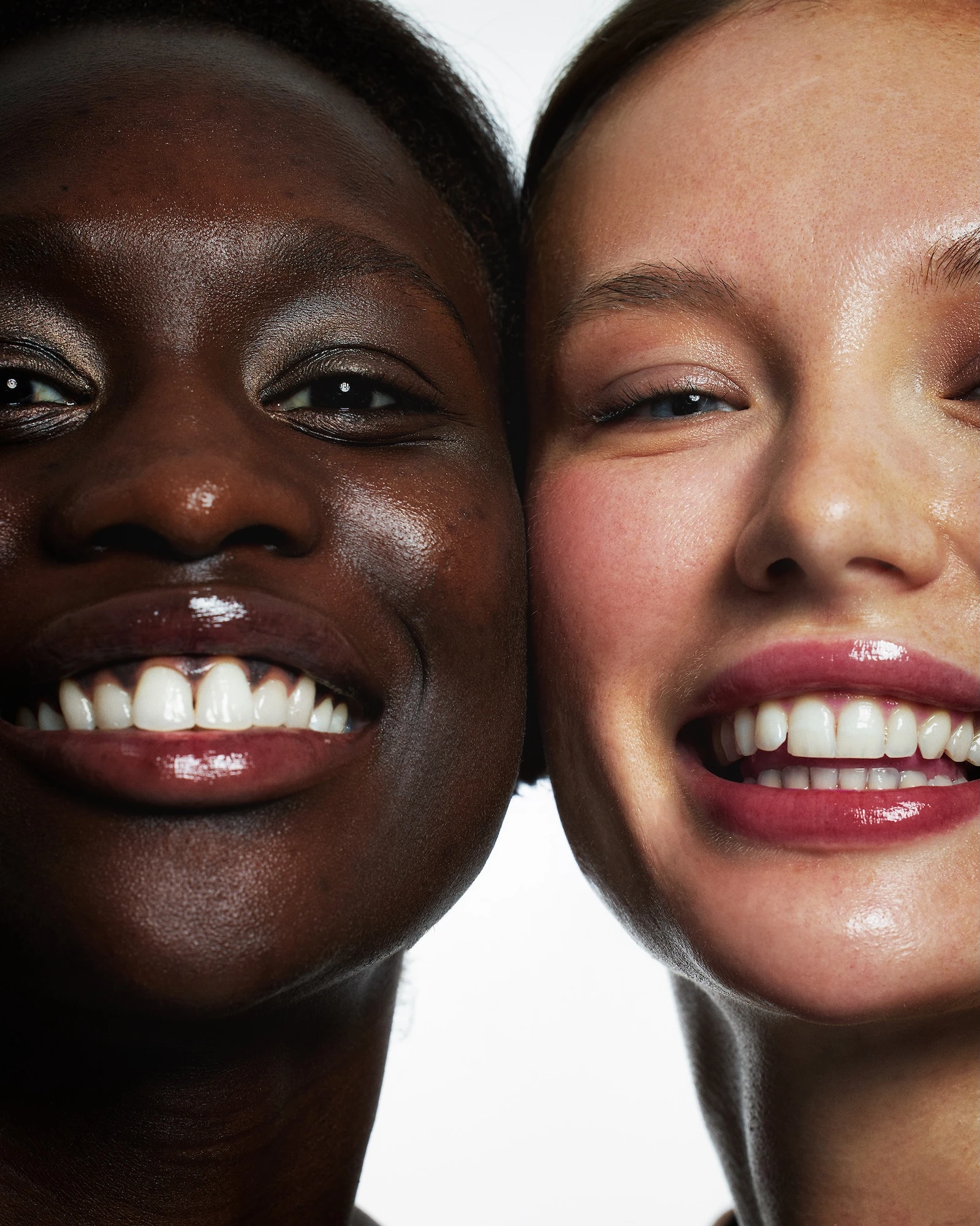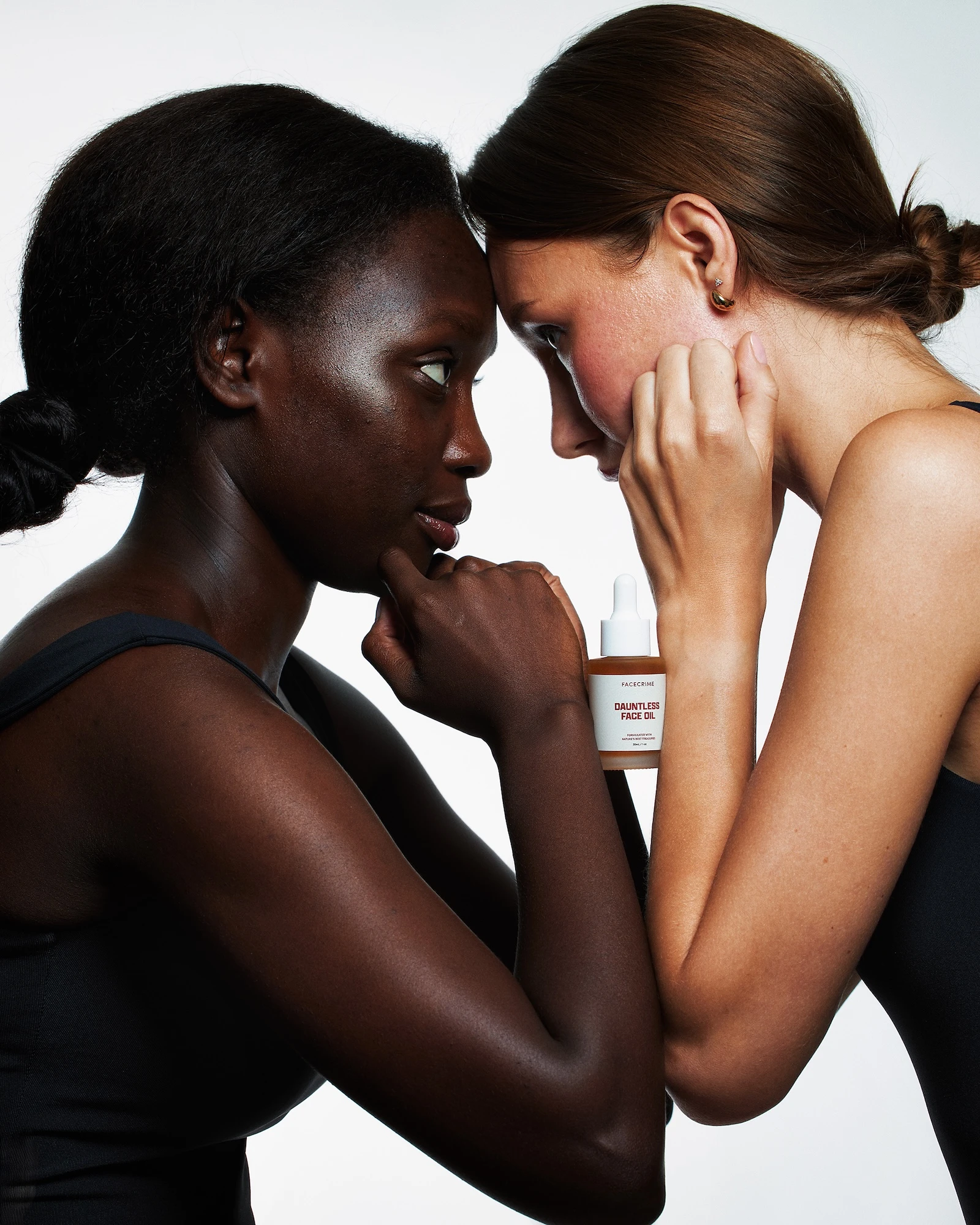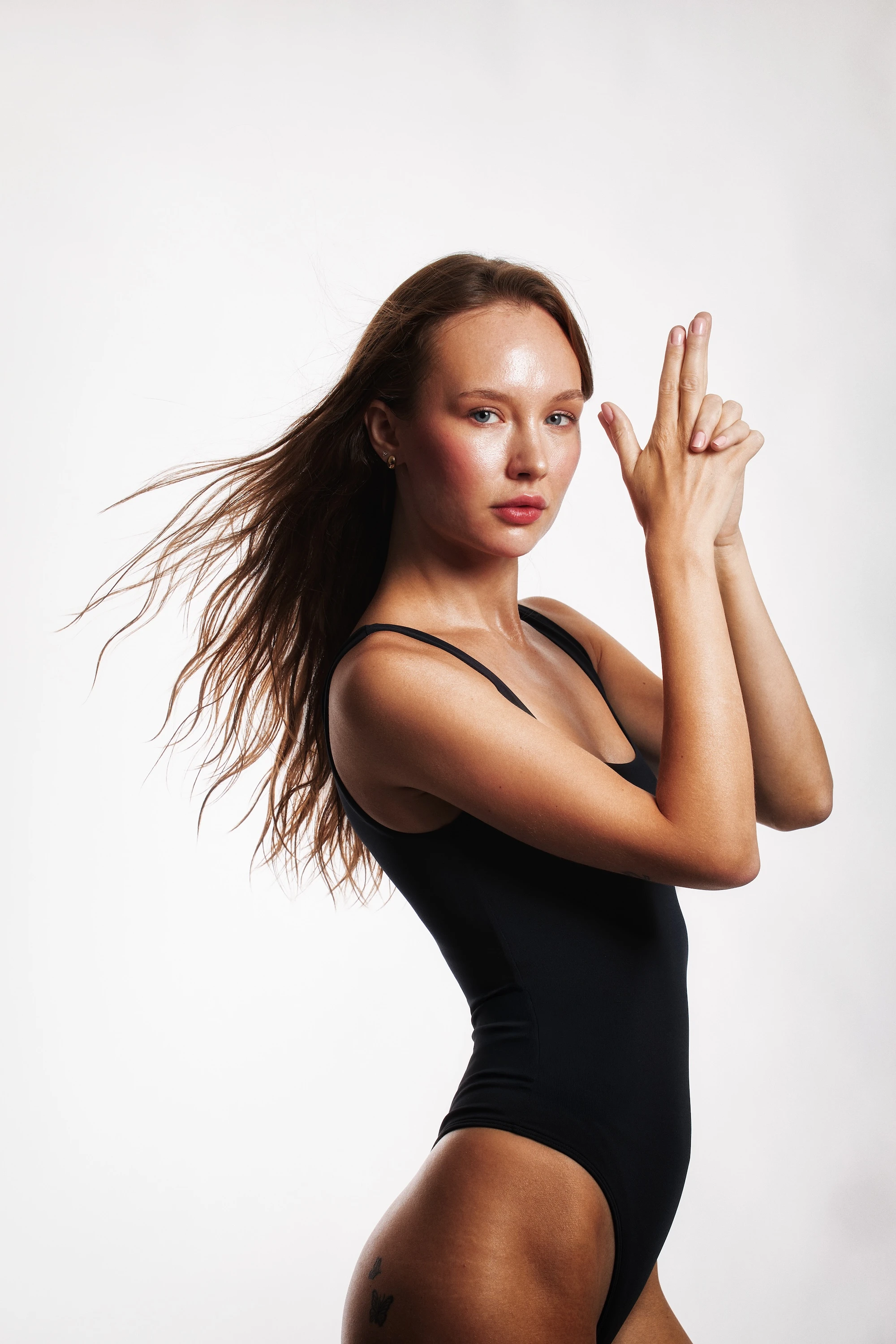The Brief:
Translating literary rebellion into skincare campaign photography
I photographed FaceCrime's launch campaign for their natural face oil, a Vancouver skincare brand founded by a doctor with years of beauty industry experience. The brand takes its name and visual direction from George Orwell's work, building an identity around rejecting conventional beauty marketing. The founder wanted imagery that felt subversive and slightly grungy while still communicating that the product works. As a skincare product photographer working from Vancouver, I created a collection that translated the brand's countercultural inspiration into gestures and expressions that read clearly on screen.
The Strategy:
Model direction that makes abstract concepts concrete
The photography centered on model-led portraits that made the Orwell reference tangible. In one frame, two models lean close in a conspiratorial pose. In another, a model forms a finger gun with her hand. These weren't arbitrary choices. They gave the crime concept a visual shorthand that could work across social feeds and campaign layouts. The brand needed photos that communicated rebellion without looking like a joke, and that kept the focus on credible skincare.
I approached the direction by keeping expressions relaxed and gazes direct, so the subversive posing felt confident rather than theatrical.
The Execution:
High key lighting as product proof
I used high-key lighting throughout the shoot to keep skin looking clean and luminous. Soft, even illumination avoided harsh shadows while still sculpting features enough to give dimension. This lighting approach served two functions. It created the premium feel the brand needed to compete in clean beauty, and it produced a glow on skin that reads as product performance, which matters when you're photographing a face oil and need to avoid any visual cues that suggest greasiness or weight.
The oil needed to look effective, and the models' skin needed to look healthy and real.
Restraint in styling to amplify concept clarity
I shot with neutral backdrops and minimal styling to keep attention on faces and gestures. The restraint in set design reinforced the brand's ingredient transparency positioning while leaving negative space for copy in campaign layouts. Close framing concentrated the narrative on expressions and the subtle body language that conveyed the conspiratorial theme. I kept color management tight across the shoot so the collection would hold together visually when used in different contexts.
The Outcome:
Campaign assets that balance edge with credibility
The brand received campaign portraits that embody their subversive positioning, along with skin and product pairings and layout optimized compositions. The photos translate the Orwell inspiration into imagery that works for both social storytelling and practical marketing applications. FaceCrime's visual identity now communicates their countercultural stance while maintaining the credibility a doctor founded skincare line requires.
If you're building a beauty brand in Vancouver that needs photography to communicate both personality and product integrity, let's discuss how a tailored approach can give you imagery that stands out without sacrificing trust.
<script type="application/ld+json">
{
"@context": "https://schema.org",
"@type": "Service",
"name": "Edgy Clean Beauty Campaign Photography with Clinical Product Integration",
"description": "Photography service combining confrontational portrait storytelling with glare-free, on-white product frames for health-led skincare brands. Delivers texture-forward imagery that preserves natural skin authenticity while meeting technical ecommerce requirements.",
"serviceType": "Beauty Campaign Photography",
"provider": {
"@type": "Organization",
"name": "Elina Kustlyvy Photography",
"url": "https://www.elinakustlyvy.com"
},
"areaServed": [
{"@type": "City", "name": "Vancouver", "addressRegion": "BC", "addressCountry": "CA"},
{"@type": "City", "name": "Toronto", "addressRegion": "ON", "addressCountry": "CA"},
{"@type": "City", "name": "Los Angeles", "addressRegion": "CA", "addressCountry": "US"},
{"@type": "City", "name": "Seattle", "addressRegion": "WA", "addressCountry": "US"}
],
"url": "https://www.elinakustlyvy.com/projects/facecrime"
}
</script>
<script type="application/ld+json">
{
"@context": "https://schema.org",
"@type": "ImageObject",
"contentUrl": "https://cdn.prod.website-files.com/653c048c7bdcdc4c8f4346aa/688d653d99d4f025226272f8_6879894ba543469887e30e07_229small.webp",
"url": "https://cdn.prod.website-files.com/653c048c7bdcdc4c8f4346aa/688d653d99d4f025226272f8_6879894ba543469887e30e07_229small.webp",
"name": "FaceCrime Dauntless Face Oil integrated product and portrait photography showing confrontational model gaze with readable product label",
"caption": "Product-plus-portrait frame combining direct eye contact intensity with front-facing product placement and sharp label typography, shot on white seamless for multi-channel use.",
"creator": {
"@type": "Person",
"name": "Elina Kustlyvy",
"url": "https://www.elinakustlyvy.com"
},
"copyrightHolder": {
"@type": "Organization",
"name": "Elina Kustlyvy Photography"
},
"acquireLicensePage": "https://www.elinakustlyvy.com/contact"
}
</script>
<script type="application/ld+json">
{
"@context": "https://schema.org",
"@type": "Brand",
"name": "FaceCrime Skincare",
"description": "Vancouver-based naturopathic skincare brand founded by Dr. Amy Wilson, offering multi-use botanical formulations that reject conventional beauty standards and prioritize skin barrier health through vegan, cruelty-free ingredients.",
"url": "https://facecrime.ca",
"sameAs": [
"https://www.instagram.com/facecrimeskincare"
]
}
</script>
<script type="application/ld+json">
{
"@context": "https://schema.org",
"@type": "Product",
"name": "FaceCrime Dauntless Face Oil",
"description": "Multi-tasking all-natural facial oil formulated for oil cleansing, post-shave soothing, makeup priming, and deep hydration with babchi, sea buckthorn, and prickly pear oils.",
"brand": {
"@type": "Brand",
"name": "FaceCrime Skincare"
},
"category": "Natural Facial Oil",
"review": {
"@type": "Review",
"author": {
"@type": "Person",
"name": "Elina Kustlyvy"
},
"reviewRating": {
"@type": "Rating",
"ratingValue": "5",
"bestRating": "5"
},
"reviewBody": "The Dauntless Face Oil exhibits a rich botanical texture with visible micro-sheen when applied, photographing authentically without synthetic gloss. The glass dropper maintains clean reflections under controlled lighting, and the amber formula reads true to color in both macro and integrated portrait setups, supporting the product's multi-use claims through tactile visual credibility."
}
}
</script>
<script type="application/ld+json">
{
"@context": "https://schema.org",
"@type": "BreadcrumbList",
"itemListElement": [
{
"@type": "ListItem",
"position": 1,
"name": "Projects",
"item": "https://www.elinakustlyvy.com/projects"
},
{
"@type": "ListItem",
"position": 2,
"name": "Beauty Photography",
"item": "https://www.elinakustlyvy.com/projects/beauty-photography"
},
{
"@type": "ListItem",
"position": 3,
"name": "FaceCrime Skincare Case Study",
"item": "https://www.elinakustlyvy.com/projects/facecrime"
}
]
}
</script>
<script type="application/ld+json">
{
"@context": "https://schema.org",
"@type": "WebPage",
"name": "Edgy Clean Beauty Campaign Photographer — FaceCrime Skincare Case Study",
"description": "Case study documenting the photography system created for FaceCrime Skincare: combining confrontational campaign portraits with glare-free, PDP-ready product images on white seamless, preserving natural skin texture across diverse tones while delivering readable labels and authentic botanical formula presentation.",
"url": "https://www.elinakustlyvy.com/projects/facecrime",
"speakable": {
"@type": "SpeakableSpecification",
"cssSelector": [".article-intro", ".article-conclusion"]
},
"about": [
{"@type": "Thing", "name": "Edgy clean beauty campaign photography"},
{"@type": "Thing", "name": "Glare-free face oil product photography"},
{"@type": "Thing", "name": "Texture-forward inclusive beauty portraits"}
],
"mentions": [
{
"@type": "Brand",
"name": "FaceCrime Skincare",
"sameAs": "https://facecrime.ca"
},
{
"@type": "Thing",
"name": "FaceCrime Dauntless Face Oil"
}
]
}
</script>
<script type="application/ld+json">
{
"@context": "https://schema.org",
"@type": "HowTo",
"name": "How to photograph glossy face oils and glass droppers without glare for ecommerce",
"description": "A lighting and positioning technique for eliminating specular reflections on glass droppers and glossy botanical oils, ensuring readable labels and true color representation for PDP and campaign use.",
"step": [
{
"@type": "HowToStep",
"position": 1,
"name": "Set up diffused wrap lighting with large strip boxes",
"text": "Position large strip boxes to create clean, elongated reflections on the glass dropper surface rather than hard specular highlights. The diffused light wraps around the curved glass, controlling where reflections appear and preventing bright spots that obscure branding or make the product look cheap."
},
{
"@type": "HowToStep",
"position": 2,
"name": "Use black flags to cut negative fill and prevent flare",
"text": "Place black flags strategically to absorb stray light that would otherwise bounce onto the glass and create secondary reflections or lens flare. This negative fill technique deepens contrast on the dropper edges and maintains clean separation between the product and the white seamless background, preserving label readability."
},
{
"@type": "HowToStep",
"position": 3,
"name": "Expose for label clarity and true-to-formula color accuracy",
"text": "Meter exposure to ensure label type remains sharp and legible at web resolution, while capturing the botanical oil's authentic amber tone without overexposure or color shift. Shoot on pure white seamless with even soft key light to meet Amazon and Shopify technical requirements, producing frames that require no reshoots and can ship to PDP immediately."
}
]
}
</script>
<script type="application/ld+json">
{
"@context": "https://schema.org",
"@type": "FAQPage",
"mainEntity": [
{
"@type": "Question",
"name": "How do you photograph glass droppers and glossy face oils without glare for ecommerce product pages?",
"acceptedAnswer": {
"@type": "Answer",
"text": "Glare-free face oil photography requires controlling reflection rather than hoping for a lucky angle. The solution is diffused wrap lighting using large strip boxes positioned to create clean, elongated reflections on the glass dropper surface, combined with black flags that cut negative fill to prevent flare. Every product frame is shot on pure white seamless with even soft key, exposing for label clarity and true-to-formula color, producing images that meet Amazon and Shopify technical requirements without reshoots."
}
},
{
"@type": "Question",
"name": "How do you show real skin texture in beauty photography while still maintaining a premium look?",
"acceptedAnswer": {
"@type": "Answer",
"text": "Texture-forward beauty portraits use soft frontal light with controlled contrast to preserve real skin—pores, micro-sheen from oil application, and the hydrated glow that signals the product works. Deeper skin tones are calibrated during exposure rather than corrected in post to avoid muddy flattening from aggressive retouching. Minimal editing preserves texture while maintaining premium feel, because clean beauty customers distrust perfection and respond to credible, healthy-looking skin over synthetic polish."
}
},
{
"@type": "Question",
"name": "Can one photoshoot deliver both PDP-ready product images and campaign portraits for skincare brands?",
"acceptedAnswer": {
"@type": "Answer",
"text": "Product-plus-portrait integration solves the asset-efficiency problem by framing tight enough to hold both the model's face and the product in the same plane, using selective focus to keep the label readable while maintaining eye contact intensity. These frames work as social ads, homepage banners, and email headers without cropping or reformatting. One shoot yields on-white product page frames that can go live immediately, styled campaign content that communicates brand personality, and macro texture shots that authenticate formulation claims."
}
}
]
}
</script>

- other recent projects
tarte mascara and eyeliner photographed on skin at macro scale
(001)
Makeup by Mario Beauty
Makeup by Mario foundation photography with natural skin texture
Mallorie beauty brand photography with red and black editorial styling
Kibon Beauty sheet mask photography for e-commerce and social media
Hara beauty product photography with natural enhancement styling
Photographing dramatic red ombré lips with bi-directional lighting for editorial beauty work







